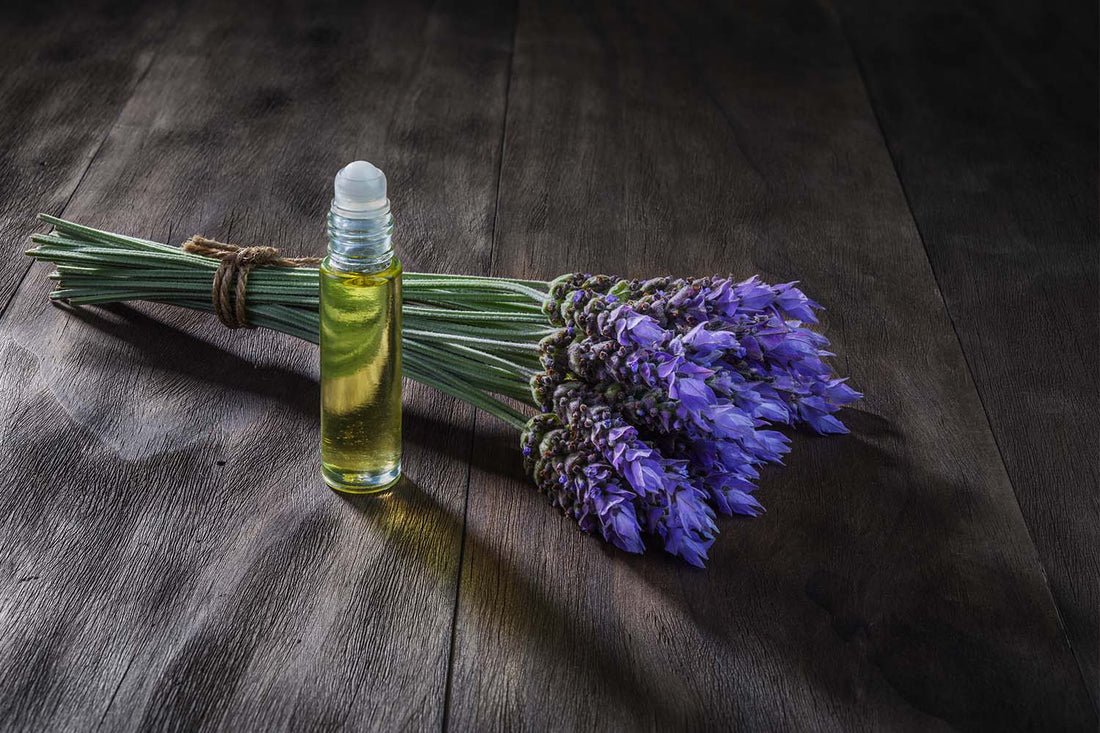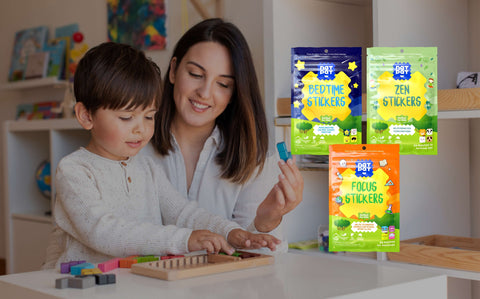Anxiety is an ailment that can affect our lives at any given moment. As adults, our day-to-day lives can get hectic and full and cause overwhelming thoughts of worry, among other emotions. What’s worse, even our kiddos seem extra stressed out. Since the pandemic, rates of childhood anxiety have risen exponentially.
We need to find better and more long-term solutions to our anxiety that are safe and natural to use. This is where essential oils come into play.
Indigenous communities have used this natural remedy for hundreds of years to soothe mental and physical pains and even as a natural bug repellant.
Today, we’re reviewing how to use essential oils to help reduce symptoms of anxiety.
What Is Anxiety?
Let’s start with defining what anxiety is. Anxiety is best defined as the feelings of worry, concern, or dread that can consume us.
These feelings can grow and may keep you up at night wondering and fretting over how everything will turn out. As a result, you might lose sleep, concentration, and hours of your life in a state of emotional unwellness.
Anxiety can come and go as quickly as situations do. Still, many times people are consumed by their feelings and find it hard to let them go even after the situation is over. When this occurs, anxiety moves from a one-time occurrence into what is known as an anxiety disorder.
Common Symptoms and Warning Signs
Anxiety doesn’t come with a warning, but there are tell-tale signs that can clue you in to what’s happening in your head.
Signs and symptoms of anxiety include:
- Easily agitated, frustrated, or tired
- Constantly squirming or fidgeting, pacing or moving rapidly from one task to another without completion
- Rapid heartbeat or labored breathing
- Trembling or feeling cold frequently
- Trouble concentrating and worrying about minor day-to-day activities
Over time and without any action to remedy them, these feelings of overwhelming emotion can take over your body and life, and eliminating anxiety can grow increasingly harder to do.
What Does Anxiety Do To the Body?
Anxiety can have plenty of effects on the body; some are physical, and others are emotional.
Acne and chronic migraines are some of the first tangible symptoms you can see. When you worry, your body releases a stress hormone called cortisol. Rising cortisol levels lead to increased blood pressure, fatigue, and more.
Anxiety can exacerbate other health conditions like asthma or hypertension.
Common Remedies or Treatments for Anxiety
Many common treatments and remedies can calm anxiety, and they’re important to know them all. While essential oils are one way to help fight the symptoms and effects of anxiety, sometimes the problem requires more than one treatment.
Consider these options and speak to your healthcare provider if you notice that your anxiety levels are reaching all-time highs and you’re unable to curb certain behaviors and feelings.
Therapy
One of the more popular treatments for anxiety and depression is therapy. People often feel that the best option for treating worry and uneasy feelings is to talk to a healthcare professional about it.
Opening up about thoughts and feelings to someone without judgment can be a freeing experience and one of the most direct ways to let go of worry. We may sometimes internalize our stressors, and chatting with a therapist allows us the space to speak openly. For many, this is liberating.
Meditation
Another popular remedy is meditation, the act of sitting or lying still for sustained periods, generally with your eyes closed and in total quiet. Some find it helpful to add music, typically just instrumentals, and the goal is to concentrate on your thoughts and feelings. Others prefer guided meditation.
People may feel dread or worry because there aren’t enough hours in the day to fully dedicate enough headspace to sorting out details of an upcoming event. Meditation forces you to tackle problems and work through them in a quiet, peaceful environment. Setting this time aside for yourself might seem tedious at first, but after time, you’ll find it to be a crucial part of your week.
Adequate Exercise
Exercise is not only healthy for your overall well-being but is a crucial component of a healthy mind. When you take time out for your body to get exercise, your brain gets a break from working so hard.
You’ll also notice that on days where you’re particularly stressed out, you’ll fidget and squirm a lot and won’t be able to concentrate very long on tasks.
Taking time out for a walk around the block will sort out those legs and limbs that can’t seem to settle down on their own. This is an excellent option for kids if you notice they seem particularly distracted or on edge lately. Giving them time for exercise will help them get out pent-up energy and offer a chance to talk about what’s been bothering them.
Prescription Medications
Many times a psychiatrist will refer you to a therapist but also may prescribe medications to rectify any hormonal imbalances in the body. These medications could help curb the worrisome thoughts and uneasy feelings that may not go away on their own.
While we always strive to be as natural as possible, chemical imbalances in the brain and body don’t always fix themselves without outside help. Utilizing prescription medications, like antidepressants, can help to curb negative thoughts and leave you in a better mindset for yourself and your family.
The only downside is many of these drugs can come with side effects. Of course, a serious and thorough conversation with your healthcare provider is necessary before accepting medications but shouldn’t necessarily be ruled out in chronic anxiety situations.
Essential Oils
Sometimes, we all have those days when the negative thoughts and feelings are just too much.
Essential oils might be able to fill those gaps that other remedies can’t. They’re an all-natural option when you just need a little boost in the right direction.
With all the options on the market, you’ll be able to create a blend of oils that can boost mood, create an uplifting, calming effect on the body and stimulate better concentration and focus.
Why Do Essential Oils Work?
Even with all the options available to curb anxiety, we do think that trying everything naturally while you work out with your doctor is a great way to start.
You may find that you don’t need additional support or that additional support is secondary to essential oils because you get enough aid with their continued use.
What Essential Oils Help With Anxiety
You’ll want to create a blend of essential oils to get the best and most out of your essential oils. Why?
Well, different essential oils have different beneficial qualities. These qualities work together and play off of each other to give you the best defense against various ailments. You can still get a lot of beneficial use out of one singular essential oil, but if a group of oils will work together to give you more, why not?
These are the best essential oils to help ease anxiety:
- Lemon
- Mandarin
- Grapefruit
- Atlas cedarwood
- Bergamot
- Chamomile
- Ylang ylang
- Vetiver
- Sweet orange
- Tea tree
- Clary sage
These essential oils come with a variety of benefits. Some are antimicrobial, and others stimulate the cognitive sense, providing a better and more positive outlook for the day. Others have proven benefits of creating a relaxing effect on the nervous system, so you can really relax when you have the time (this can be especially helpful if you’re thinking of adding meditation time to your day).
Regardless of your choice, the use of essential oils has proven effective at treating anxiety symptoms and decreasing their occurrence. It’s a great start in your journey to better mental health.
How To Use Essential Oils for Stress Relief
There are a few different ways to utilize essential oils to benefit, but you’ll need to follow a few steps.
Apply Topically
Essential oils are highly concentrated extracts from different herbs, spices, and plants. To use them safely and properly, you must dilute them with a carrier oil first. This carrier oil acts as a holder for the extracts and makes them safe to use.
Typical carrier oils are olive oil, coconut oil, and a few others. These oils will make the essential oils perfect for individual use but also keep them strong enough to be effective.
You can also use essential oils directly on the skin. Some of the surest ways and spots are behind the ears, on the neck, and on the wrists.
The downside of this method: essential oils can irritate the skin. Anyone with sensitive skin will have to be careful when applying oils directly on the body, as hives, rashes, or allergic reactions can occur.
Another downfall is they can wear off very quickly. They only last up to two hours no matter what, but many of us will accidentally, or intentionally with kids, rub them off before they can even be helpful.
Power Up a Diffuser
A diffuser utilizes the effects of aromatherapy to get the benefits from essential oils. Aromatherapy is a type of holistic treatment when the patient inhales essential oils. Aromatherapists can help as they act as specialists for the specific type of oils that will benefit you the most.
Inhaling the scents is a direct line to your olfactory senses. These trigger chemical responses in your brain for the desired effects. For example, if you’re using essential oils for issues with sleep, you’ll be able to diffuse an essential oil blend into the air, and your brain will ease into sleep smoother and faster.
The effects of aromatherapy are fast, as it’s the most direct way to get the essential oils to your body. However, diffusers are stationary and require a lot of oil to fill a room. The oils will stay in the air for a while, up to two hours. But, unless the diffuser is substantial enough for the size of your room, you won’t be able to get the most out of them.
Sprays or Lotions
A lot of people like to create creams, lotions, or sprays infused with essential oils. This works well for citrus oils, like lemon or orange, as they have disinfectant qualities.
Again, the trouble will be the amount required to be effective and the fact that many lotions will be rubbed off before being useful. Those perfume and floral scents do smell amazing, though.
Essential Oil Patches
We know that essential oils work, but to get the most out of them, you’ll need to be able to take them on the go, keep them off the skin, breathe them in, and ensure they last long enough to actually be effective.
Cue our ZenPatch. It’s a blend of all-natural essential oils that come in a sticker form. Our technology releases the best blend of essential oils for fighting anxiety at regular intervals over an eight-hour period of time. Relief is fast, effective, and long-lasting.
The ZenPatch is powered by mandarin, sweet orange, atlas cedarwood, and lavender essential oils. A simple, user-friendly solution — no dilution or carrier oils needed.
The best part? We have a range of patches that work for treating other ailments as well. These include insomnia (try our SleepyPatch), allergies (AllergyPatch), and others. They’re safe for kids and go on clothes. Once you stick them on, you’ll forget you’re even wearing them (except for the awesome effects).
Help Is Here
Here at The Natural Patch Co., we are proud to use time-tested, all-natural essential oils for our products. Not only are they safe, but they’re also proven effective at relieving symptoms of various ailments.
By creating your one-of-a-kind anxiety-fighting toolkit, you can find relief from pressure, stress, and anxiety. With a little time, you might just notice a big difference. Soon, your whole house will be a den of zen in no time.
Sources:
Anxiety disorders - Symptoms and causes | Mayo Clinic
The Effect of Aromatherapy on Anxiety in Patients | PMC
Stress Symptoms: Physical Effects of Stress on the Body | WebMD
Research Update: Children's Anxiety and Depression on the Rise | Georgetown University


